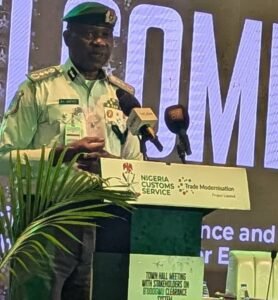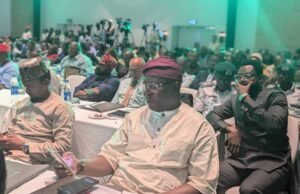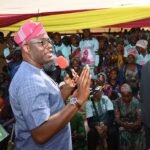
Comptroller-General of customs, Bashir Adeniyi, during the stakeholders meeting in Lagos on Monday
Some maritime stakeholders in Lagos, including clearing agents, importers, and exporters, have expressed satisfaction with the implementation of the Customs operational platform known as B’Odogwu.
They gave their commendations at a Town Hall Meeting on B’Odogwu Clearance, held with stakeholders in Lagos on Monday.
The meeting was with the theme: ‘Enhancing Trade Compliance and System Optimisation Through Stakeholder Engagement’.
B’Odogwu, the Unified Customs Management System (UCMS), integrates key functions such as declarations, risk management, duty calculation, permits, manifests, and cargo tracking into one system.
President of Bonded Terminal Association , Mr Jerald Mbamara, said the platform was flexible and could be accessed through mobile phones and iPads.
Mbamara noted that cargo tracking had improved with B’Odogwu, reducing both the time and cost of doing business compared to the former NICIS II system.
A freight forwarder, Mr Olubiyi Ibrahim, said B’Odogwu allows users to view rotation numbers, enhancing transparency in cargo movements.
A terminal operator, Mrs Olodunni Kareem of Lagos Free Trade Zone, suggested the inclusion of indigenous languages for broader accessibility.

A banker from WEMA Bank, Mrs Princess Okezie, said the platform was fast, resolving former difficulties associated with accessing Form M.
Okezie praised Customs officers for their commitment, prompt attention to issues, and overall responsiveness to customers’ concerns.
She said the platform has improved accountability for both Customs and stakeholders, enhancing system integrity beyond previous platforms.
Bankers from Fidelity, Eco Bank, and Zenith also affirmed that B’Odogwu enabled zero-defect transactions in their operations.
In his keynote address, Comptroller General of Customs, Bashir Adeniyi, said the Federal Government signed a 20-year Concession Agreement with the Trade Modernisation Project (TMP).
Adeniyi said the Customs Service had adopted a world-class modernisation initiative, transforming B’Odogwu to support seamless trade facilitation.
He explained that B’odogwu is a fully digital platform created to streamline operations, remove bottlenecks, and increase transparency in Nigeria’s trade system.
He said the Town Hall meeting aimed to engage stakeholders, exchange ideas, and strengthen the cargo processing framework.
Adeniyi thanked stakeholders for celebrating his election as Chairman of the World Customs Organisation (WCO) Council.
He stressed the importance of transparency, urging stakeholders to uphold international best practices in their dealings.
He said meeting global standards would require significant technology investments and encouraged stakeholders to consult the Customs help desk when needed.
Adeniyi stated that Customs aimed to make B’Odogwu a global benchmark within the next three years.

He revealed that the one per cent Comprehensive Import Supervision Scheme (CISS) had been upgraded to four per cent Free on Board (FoB).
He said Customs would stop receiving seven per cent from the Federation Account and instead use four per cent from FOB charges.
“One per cent from CISS will be removed; only 100 per cent of revenue will go to the Federation Account,” he explained.
Deputy Comptroller of Trade Facilitation, Kikilomo Adeola, described B’Odogwu as a transparent system enhancing cargo clearance and reducing turnaround time.
Adeola added that the system gives agencies real-time access, automates workflows, and improves data reliability.
She said it empowers Customs officers, agents, and regulators to ensure faster clearance and higher revenue collection.
Adeola noted that B’Odogwu promotes compliance with global trade standards and was officially launched on Oct. 23, 2024 at PTML Command.
She said feedback revealed a few importers still faced challenges using the system, but these were manageable.
Adeola urged stakeholders to overcome difficulties through education, engagement, and shared responsibility.
In his closing remarks, Zonal Coordinator Zone ‘A’, ACG Charles Orbih, appreciated stakeholder participation and encouraged continued feedback on B’Odogwu.
============









